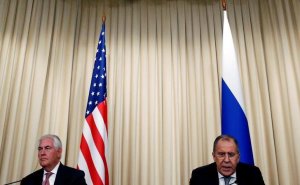
Josh Cohen
Josh Cohen is a former USAID project officer involved in managing economic reform projects in the former Soviet Union. He contributes to a number of foreign-policy-focused media outlets.
Russian Foreign Minister Sergei Lavrov and U.S. Secretary of State Rex Tillerson attend a news conference following their talks in Moscow, Russia, April 12, 2017. REUTERS/Sergei Karpukhin
During his presidential campaign, Donald Trump’s verbal affection for Russian President Vladimir Putin so puzzled the Washington establishment that some speculated Putin had either "recruited Mr. Trump as an unwitting agent of the Russian Federation” or that Trump was simply a "useful fool” for the Russians.
But 100 days into Trump’s presidency, this seems anything but true. After the United States retaliated for the Assad regime’s chemical weapons attack, Washington and Moscow are engaged in a harsh war of words.
Washington blames Russia for the gas attack, while Moscow accused the United States of breaking international law and suspended a Russian-American agreement to coordinate air operations over Syria. Trump now says U.S.-Russian relations "may be at an all-time low," while Putin says the relationship has become worse since Trump took office.
While Republican hawks and even some Democrats praised Trump’s about-face on Russia, let’s be clear about one thing: Whatever differences exist between the United States and Russia, an improved relationship with the Russians is good for America. Here’s why:
With over 14,000 nuclear weapons between them, Russia and the United States have the ability to destroy each other – not to mention the rest of the world – many times over. Both sides are modernizing their nuclear arsenals to make them even more lethal, and the risk of an accidental nuclear war is growing.
But from Trump’s "let it be an arms race” comment to his apparent denuciation of a treaty that caps U.S. and Russian deployment of nuclear warheads, the president seems to be ignoring this risk.
If Trump truly believes in an "America First” foreign policy, he should focus on reducing the risk of a U.S.-Russian nuclear war – something that can only happen if Washington talks to Moscow.
Both the United States and Russia want to combat global terrorism. As the recent suicide attack on a metro train in St. Petersburg and the January bombing of an Istanbul nightclub showed, an increasing number of Russian speakers from the former Soviet Union are becoming radicalized. An estimated 5,000 to 7,000 of them fight with Islamic State – including 2,400 from Russia itself.
The United States also needs Russia to help resolve – or at least contain – various crises in regional hotspots. In Syria, for example, Russia’s relationship with the Assad regime means that no solution to end the civil war is possible without Russian assistance, especially if the Trump administration now wants Assad removed from power.
Russia has deepened its economic links with Pyongyang, and as one of five permanent members of the U.N. Security Council can either help or hinder any further U.S. efforts to squeeze North Korea economically or politically.
Unfortunately for the United States, though, Moscow just blocked a draft U.S. statement in the U.N. Security Council condemning the latest North Korean missile test – once again demonstrating its ability to impact American national interests.
Washington and Moscow also share a mutual interest in reducing the risk of a NATO-Russian military confrontation in Europe. Unfortunately, though, most channels of Russian-American communication are on hold since Russia’s annexation of Crimea, increasing the risk that even a minor incident between the two sides could spiral out of control. Russia’s strategy of threatening to use nuclear weapons as a way of forcing its enemy to back down increases the chance of a disaster.
Finally, the United States will suffer if Russia and China align against it. During the Cold War, then-Secretary of State Henry Kissinger pursued so-called "Triangle Diplomacy” where Washington sought to develop better relations with both Beijing and Moscow than the two communist giants had with each other.
The current downturn in the U.S.-Russian relationship could drive Russia into China’s arms, making the United States the odd man out in a new triangle. With China set to become the United States’ leading geopolitical rival in the coming years, Washington should try to avoid this scenario – something that an improved Russian-American relationship could help do.
Major hurdles exist. Many of Trump’s senior appointees – such as his nominee for U.S. ambassador to NATO Richard Grenell, his new National Security Council Russia expert Fiona Hill and hisNational Security Adviser H.R. McMaster – are more hawkish than Trump was during his campaign.
The ongoing investigation into the Kremlin’s involvement in the election makes it politically difficult for Trump to pursue better relations with Moscow, even if he wants to. Some speculate that Trump’s newly hardened stance on Assad is partially driven by the administration’s desire to counter the perception that Trump remains overly cozy with Russia.
Even if Trump can overcome these obstacles in Washington, there’s still no guarantee he could agree with Putin on many key issues. From missile defense to Syria to Ukraine, the two sides’ views may be too far apart to bridge.



_jpg/250px-ElbeDay1945_(NARA_ww2-121).jpg)





